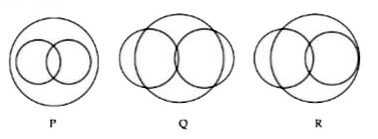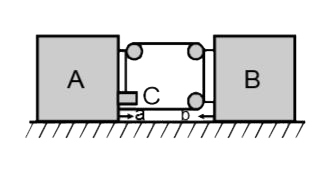" We will play only if weather is good and ground isn't wet" Find the Negation of above statement
To find the negation of the statement "We will play only if the weather is good and the ground isn't wet," we can follow these steps:
1. Identify the Statements:
- Let p: "We will play."
- Let q: "The weather is good."
- Let r: "The ground isn't wet."
2. Express the Given Statement:
- The statement "We will play only if the weather is good and the ground isn't wet" can be expressed in logical terms as:
p⟹(q∧r)
This means that if we play, then the weather must be good and the ground must not be wet.
3. Negate the Statement:
- The negation of the implication p⟹(q∧r) can be expressed using the logical equivalence:
¬(p⟹(q∧r))≡p∧¬(q∧r)
- This means we will play and it is not true that both the weather is good and the ground isn't wet.
4. Apply De Morgan's Law:
- Now, we can apply De Morgan's Law to the negation of the conjunction:
¬(q∧r)≡¬q∨¬r
- Therefore, the negation becomes:
p∧(¬q∨¬r)
5. Rewrite in Words:
- Finally, we can translate this back into words:
- The negation of the original statement is: "We will play and either the weather isn't good or the ground is wet."
Final Answer:
The negation of the statement "We will play only if the weather is good and the ground isn't wet" is:
"We will play and either the weather isn't good or the ground is wet."
- Let p: "We will play."
- Let q: "The weather is good."
- Let r: "The ground isn't wet."
- The statement "We will play only if the weather is good and the ground isn't wet" can be expressed in logical terms as:
p⟹(q∧r)
This means that if we play, then the weather must be good and the ground must not be wet.
- The negation of the implication p⟹(q∧r) can be expressed using the logical equivalence:
¬(p⟹(q∧r))≡p∧¬(q∧r)
- This means we will play and it is not true that both the weather is good and the ground isn't wet.
- Now, we can apply De Morgan's Law to the negation of the conjunction:
¬(q∧r)≡¬q∨¬r
- Therefore, the negation becomes:
p∧(¬q∨¬r)
- Finally, we can translate this back into words:
- The negation of the original statement is: "We will play and either the weather isn't good or the ground is wet."
The negation of the statement "We will play only if the weather is good and the ground isn't wet" is:
"We will play and either the weather isn't good or the ground is wet."
Similar Questions
Knowledge Check
Direction: In these questions, sentences are given with blanks to be filled in with an appropriate word(s). Four alternatives are suggested for each question. Choose the correct alternative out of the four alternatives.
We shall go for a picnic if the weather __ good.A1) isB2) wasC3) has beenD4) had beenDirections: In the following question, some part of the sentence may have errors. Find out which part of the sentence has an error and select the appropriate option. If a sentence is free from error, select 'No Error'.
You have been working very hard (A)/ for the past two years.(B)/ isn't it? (C)/ No Error (D)AABBCCDD
Write the negation of the following statement and check whether the a resulting statement is true: There does not exist a quadrilateral which has all its sides equal.
View SolutionThe classification of children according to their ages, playing on a ground is shown in the following table. Find the mode of ages of the children.

View SolutionThe given pie chart shows the games played by 1,500 students of a school. Eastudent plays only one game. Find the ratio of the students who play hockey tothose who play badminton.
View SolutionAccording to Shastras only the Kshatriyas could be the king but we find several exceptions to this rule. Explain the statement.
View SolutionIn a school, there are three types of games to be played. Some of the students play two types of games, but none play all the three games. Which Venn diagrams can justify the above statement ?

View SolutionConsider the following statements :
1. Weathered rock with change of volume is called saprolite.
2. The process of landscape formation by deep weathering followed by stripping of the saprolite is called etching.
Which of the statements given above is/are correct?
View Solution

